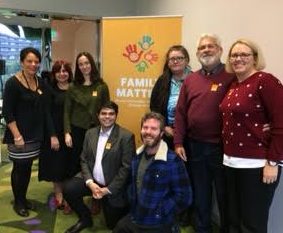By Megan Whitfield | @M_eganWhitfield
RMIT hosted a ‘You Can’t Ask That’ style meeting earlier this week, its first event held in conjunction with Family Matters, a national campaign to ensure Aboriginal & Torres Strait Islander children people grow up safe and cared for in family, community and culture.
As part of the 2017 National Week of Action, representatives from RMIT Social Work students and alumni, Family Matters and campaign-leader Secretariat of National Aboriginal and Islander Child Care (SNAICC), sat down to have a ‘Difficult Conversation’, broaching the over-representation of Aboriginal and Torres Strait Islander youth in out-of-home care in Australia.
According to 2015 Family Matters snapshot data, Aboriginal and Torres Strait Islander children are 9.5 times more likely to be removed by child authorities than non-indigenous children. Without effective action being taken, it is predicted the number of children removed by protection authorities will triple.
The aim of the meeting—and overall campaign—was to inspire open conversation and increased awareness of the fundamental issues that affect Aboriginal and Torres Strait Islander children, with emphasis on the removal of these children from their communities and culture.
Save the Children campaign manger and panelist, Peter Nathan, says RMIT was approached as a partner due to their reputation in innovation, and through the desire to involve future influences who will have direct involvement in the social work industry in only a matter of years.
From the get-go students were looking to do more than just hold awareness raising events, said Mr Nathan.
“They were bringing energy to put into action from the beginning,” he said.
The ‘You Can’t Ask That’ format of the ‘Difficult Conversations’ meeting was suggested by students, inspired by the success of the ABC program focused on providing an environment where any questions were welcomed and would be answered openly.
When Family Matters first began discussions with RMIT, students were apprehensive to broach subjects, said Mr Nathan. The students preferred Aboriginal people to speak, he said, to provide a voice to families who often may not be heard.
The panelists, including SNAICC CEO, Gerry Moore, tackled questions including ‘what do you think of social workers?’, ‘why aren’t there enough Aboriginal foster carers?’ and ‘In your perspective, why do you believe there is this over-representation in care services?’
Discussion considered the remaining stigmas and lack of understanding around both Indigenous culture and social work as major contributing factors.
As noted by SNAICC Resources Manager, Jenine Godwin, it has only been two to three generations since colonisation—the impacts are still being strongly felt.
Mr Moore echoed this sentiment, by drawing on his own experiences.
“I’m 62, and the gates that used to lock us in on our mission are still fresh in my mind,” he said.
Mr Moore noted that his first memory of school was being humiliated by his teacher, who told the other students that he was “stupid”.
“You’re knocked down before you learn to stand,” he said.
Students from RMIT were invited to attend the meeting, with most of the attendees coming from the RMIT School of Global, Urban and Social Studies.
A social work and psychology student, Ash, was drawn to the event because she believes it is vital for all Australians to fully realise the lingering impact colonisation has upon modern Aboriginal and Torres Strait island people.
“We live in a time where effects of colonisation are a still having a real life impact,” she said.
“We need to keep our fingers on the pulse.”
This event was the first in the ongoing relationship between Family Matters, SNAICC and RMIT University.
The 2017 National Week of Action ran from 14-20 May.

